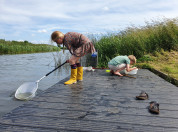Search
Filter by
Type
Tags
Dossiers
Themes
Departments
Active filters
1032 search results
Search results
-
Netherlands Long-term Ecosystem Research Network (LTER-NL)
The Netherlands has a strong tradition in long-term ecological research, with for instance internationally renowned population studies on tits started in the 1950s by the NIOO, population studies on benthic animals started in the 1970s by the NIOZ and citizen science bird monitoring started by Sovon Dutch Centre for Field Ornithology started in the 1970s. It was however not until 2010 that LTER-NL, the Dutch network for Long-term Ecosystem Research, was developed from scratch, with
WaLTER
(external link)
(Wadden Sea Long-Term Ecological Research) as the starting point. In 2014 LTER-NL, consisting of only the LTSER-platform Dutch Wadden Sea, was provisionally admitted to the international umbrella organizations
ILTER
(external link)
and
LTER-Europe
(external link)
. In 2015, the Veluwe LTSER platform was added along with the Belgium listed LTSER-platform Scheldt Estuary, which includes the Dutch Westerschelde. In 2016 LTER-Netherlands was unconditionally admitted to ILTER and LTER-Europe. -
Citizen Science at NIOO
'Community' science has been gaining momentum in recent years. At NIOO, we've always valued the contributions of citizen scientists. In fact, our oldest citizen science project goes back more than a century.
-
In pictures
The sustainable NIOO-KNAW building in pictures.
-
Parties involved
Parties involved in the development of the sustainable NIOO-KNAW building. -
Awards
The Netherlands Institute of Ecology (NIOO-KNAW) has racked up an impressive collection of awards and nominations for its building. -
Tours
Tours are strictly limited, and are only possible under certain conditions. That's because the primary process of our scientific work comes first. -
Plants provide power
Need a place to recharge your phone? Our roof features 25 m2 of energy-producing green!
-
Green roof 2.0
Imagine an oasis of green high above the bustle of urban life… at NIOO, nature's going through the roof! -
Multifunctional grounds
Besides the latest ecotechnology, the grounds also feature aviaries, ponds, greenhouses and experimental gardens.
-
Bringing nature into the city
We aim for maximum biodiversity on and around our building. But what can we do to increase it?
